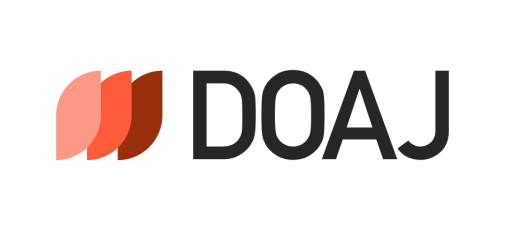Kepribadian Proaktif sebagai Mediator antara Dukungan Orangtua dan Efikasi Diri dalam Pengambilan Keputusan Karier Siswa Sekolah Menengah Pertama
Abstract
Abstract: This study aims to examine the role of proactive personality as a mediator of the relationship between parental support in career and self-efficacy in career decision making in junior high school students. The research sample of 140 people obtained by accidental sampling. The instruments used were Career-Related Parent Support Scale, Career Decision Self-Efficacy Short Form, and Proactive Personality Scale which had been adapted into Indonesian. The data were analyzed by regression using PROCESS macros suggested by Hayes. The results showed that proactive personality partially mediates the relationship between parental support in career and self-efficacy in career decision making. Further analysis shows that: (1) proactive personality partially mediates the relationship between parental support in the form of instrumental assistance and self-efficacy in career decision making; (2) proactive personality partially mediates the relationship between parental support in the form of career modeling and self-efficacy in career decision making; (3) proactive personality partially mediates the relationship between parental support in the form of emotional support with self-efficacy in career decision making; and; (4) proactive personality fully mediates the relationship between parental support in the form of verbal encouragement with self-efficacy in career decision making. The implications, limitations and suggestions for further research are discussed as follows.
Abstrak: Penelitian ini bertujuan untuk menguji peran kepribadian proaktif sebagai mediator hubungan antara dukungan orangtua dalam karier dan efikasi diri dalam pengambilan keputusan karier siswa Sekolah Menengah Pertama (SMP). Sampel penelitian berjumlah 140 orang yang diperoleh dengan accidental sampling. Instrumen yang digunakan adalah Career-Related Parent Support Scale, Career Decision Self-Efficacy Short Form, dan Proactive Personality Scale yang sudah diadaptasi ke dalam Bahasa Indonesia. Data dianalisis dengan uji regresi menggunakan macro PROCESS oleh Hayes. Hasil penelitian menunjukkan bahwa kepribadian proaktif memediasi secara parsial hubungan antara dukungan orangtua dalam karier dan efikasi diri dalam pengambilan keputusan karier. Analisis lanjutan menunjukkan bahwa: (1) kepribadian proaktif memediasi secara parsial hubungan antara dukungan orangtua yang berupa bantuan instrumental dan efikasi diri dalam pengambilan keputusan karier; (2) kepribadian proaktif memediasi secara parsial hubungan antara dukungan orangtua yang berupa pemodelan karier dan efikasi diri dalam pengambilan keputusan karier; (3) kepribadian proaktif memediasi secara parsial hubungan antara dukungan orangtua yang berupa dukungan emosional dengan efikasi diri dalam pengambilan keputusan karier; dan (4) kepribadian proaktif memediasi secara utuh hubungan antara dukungan orangtua yang berupa dorongan verbal dengan efikasi diri dalam pengambilan keputusan karier. Implikasi, limitasi dan saran untuk penelitian selanjutnya didiskusikan.
Keywords
Full Text:
PDFReferences
Ali, M., & Mukhibat, M. (2017). Dukungan keluarga, peran gender, efikasi diri pengambilan keputusan karir, dan pengharapan akan hasil terhadap career indecision siswa sekolah menengah atas negeri Kota Madiun. PALASTREN Jurnal Studi Gender, 9(2), 279–304.
Anaya, B., & Pérez-Edgar, K. (2019). Personality development in the context of individual traits and parenting dynamics. New Ideas in Psychology, 53, 37–46.
Aprilia, D. (2013). Pengaruh konseling karier terhadap peningkatan efikasi diri pada siswa SMP 12 Banjarmasin. Jurnal Studia Insania, 1(2), 89–103.
Astuti, N. D. S. (2015). Layanan bimbingan karir berbasis life skill untuk meningkatkan kemampuan merencanakan karir. Jurnal Penelitian Tindakan Bimbingan & Konseling, 1(2).
Bacanli, F. (2016). Career decision-making difficulties of Turkish adolescents. International Journal for Educational and Vocational Guidance, 16(2), 233–250.
Bandura, A. (1963). The role of imitation in personality development. Dimensions of Psychology, 16, 121–153.
Bandura, A. (1977). Self-efficacy: toward a unifying theory of behavioral change. Psychological Review, 84(2), 191.
Bateman, T. S., & Crant, J. M. (1993). The proactive component of organizational behavior: A measure and correlates. Journal of Organizational Behavior, 14(2), 103–118.
Betz, N. E., Klein, K. L., & Taylor, K. M. (1996). Evaluation of a Short Form of the Career Decision-Making Self-Efficacy Scale. Journal of Career Assessment, 4(1), 47–57. https://doi.org/10.1177/106907279600400103
Budiastuti, T. (2019). Hubungan antara orientasi masa depan dan dukungan orang tua dengan pengambilan keputusan karir pada siswa SMK. Universitas Muhammadiyah Surakarta.
Curran, P. J., West, S. G., & Finch, J. F. (1996). The robustness of test statistics to nonnormality and specification error in confirmatory factor analysis. Psychological Methods, 1(1), 16.
Direktorat Jenderal Guru dan Tenaga Kependidikan Kementerian Pendidikan dan Kebudayaan. (2016). Panduan Operasional Penyelenggaraan Bimbingan dan Konseling Sekolah Menengah Pertama.
Garcia, P. R. J. M., Restubog, S. L. D., Bordia, P., Bordia, S., & Roxas, R. E. O. (2015). Career optimism: The roles of contextual support and career decision-making self-efficacy. Journal of Vocational Behavior, 88, 10–18.
Ginevra, M. C., Nota, L., & Ferrari, L. (2015). Parental support in adolescents’ career development: Parents’ and children’s perceptions. The Career Development Quarterly, 63(1), 2–15.
Hayes, A. F. (2017). Introduction to mediation, moderation, and conditional process analysis: A regression-based approach. Guilford publications.
Hou, C., Wu, L., & Liu, Z. (2014). Effect of proactive personality and decision-making self-efficacy on career adaptability among Chinese graduates. Social Behavior and Personality: An International Journal, 42(6), 903–912.
Hsieh, H., & Huang, J. (2014). The effects of socioeconomic status and proactive personality on career decision self‐efficacy. The Career Development Quarterly, 62(1), 29–43.
Imro’atun, S. (2017). Keefektifan layanan konseling kelompok untuk meningkatkan kepercayaan diri siswa sekolah menengah pertama. Jurnal Kajian Bimbingan dan Konseling, 2(2), 50–57. https://doi.org/10.17977/um001v2i22017p050
Inguglia, C., Ingoglia, S., Liga, F., Coco, A. Lo, & Cricchio, M. G. Lo. (2015). Autonomy and relatedness in adolescence and emerging adulthood: Relationships with parental support and psychological distress. Journal of Adult Development, 22(1), 1–13.
Kaplan, R. M., & Saccuzzo, D. P. (2017). Psychological testing: Principles, applications, and issues. Nelson Education.
Kim, U. E., Triandis, H. C., Kâğitçibaşi, Ç. E., Choi, S.-C. E., & Yoon, G. E. (1994). Individualism and collectivism: Theory, method, and applications. Sage Publications, Inc.
Kristiono, W. S. (2018). Peran kelompok teman sebaya dalam menentukan pengambilan keputusan karir pada siswa kelas XI di SMK Negeri 7 Yogyakarta. Jurnal Riset Mahasiswa Bimbingan dan Konseling, 4(10), 604–614.
Kumar, R. (2019). Research methodology: A step-by-step guide for beginners. Sage Publications Limited.
Lent, R. W. (2005). A social cognitive view of career development and counseling. In S. D. Brown & R. W. Lent (Eds.), Career development and counseling: Putting theory and research to work (pp. 101–127). John Wiley & Sons Inc.
Lent, R. W. (2013). Career‐life preparedness: Revisiting career planning and adjustment in the new workplace. The Career Development Quarterly, 61(1), 2–14.
Lent, R. W., Brown, S. D., & Hackett, G. (1994). Toward a unifying social cognitive theory of career and academic interest, choice, and performance. Journal of Vocational Behavior, 45(1), 79–122.
Lim, S. A., & You, S. (2019). Long-term effect of parents’ support on adolescents’ career maturity. Journal of Career Development, 46(1), 48–61.
Matsumoto, D., & Juang, L. (2016). Culture and psychology. Nelson Education.
Michael, R., Most, T., & Cinamon, R. G. (2013). The contribution of perceived parental support to the career self-efficacy of deaf, hard-of-hearing, and hearing adolescents. Journal of Deaf Studies and Deaf Education, 18(3), 329–343.
Michaeli, Y., Dickson, D. J., & Shulman, S. (2018). Parental and nonparental career-related support among young adults: Antecedents and psychosocial correlates. Journal of Career Development, 45(2), 150–165.
Pajares, F. (2006). Self-efficacy during childhood and adolescence. Self-Efficacy Beliefs of Adolescents, 5, 339–367.
Papalia, D. E., Olds, S. W., & Feldman, R. D. (2012). Human development. McGraw-Hill.
Preston, M. (2018). Pengaruh pola asuh ayah dan ibu terhadap efikasi-diri dalam pengambilan keputusan karier yang dimediasi oleh kepribadian proaktif pada siswa sekolah menengah atas. Universitas Indonesia.
Preston, M., & Salim, R. M. A. (2018). Pengaruh pola asuh orangtua terhadap kepribadian proaktif remaja. Universitas Indonesia.
Purnamasari, D., Setyorini, & Padmomartono, S. (2015). Tingkat kematangan karir siswa kelas VIII SMP Islam Sudirman Ambarawa. Widya Sari : Jurnal Ilmiah Pendidikan, Sejarah dan Sosial Budaya, 17(2), 1–7.
Putra, A. K. (2018). Keterlibatan orang tua dalam perencanaan karir anak usia SMP di Dusun Jamburejo. Jurnal Riset Mahasiswa Bimbingan dan Konseling, 4(9), 501–511.
Putri, I. D. (2017). Gambaran kesulitan pengambilan keputusan karier mahasiswa Universitas Andalas. Skripsi. Universitas Andalas: Program Studi Psikologi Fakultas Kedokteran.
Rahma, U., & Rahayu, E. W. (2018). Peran dukungan sosial keluarga dalam membentuk kematangan karier siswa SMP. Jurnal Ilmu Keluarga & Konsumen, 11(3), 194–205.
Riany, Y. E., Cuskelly, M., & Meredith, P. (2016). Cultural beliefs about autism in Indonesia. International Journal of Disability, Development and Education, 63(6), 623–640.
Sawitri, D. R. (2009). Pengaruh status identitas dan efikasi diri keputusan karir terhadap keraguan mengambil keputusan karir pada mahasiswa tahun pertama di Universitas Diponegoro. Jurnal Psikologi Undip.
Seibert, S. E., Crant, J. M., & Kraimer, M. L. (1999). Proactive personality and career success. Journal of Applied Psychology, 84(3), 416.
Shulman, S., Hakhmigari, M. K., Michaeli, Y., Tuval-Mashiach, R., & Dickson, D. J. (2016). Achieving work and love authorship in emerging adulthood: Types, psychosocial correlations, and precursors. Emerging Adulthood, 4(4), 258–271.
Sun, J., Wu, Z., & Wang, J. (2015). The influence of professional-related parental support on career decision-making difficulties of college students. Vocational Education Research, 1, 59–62.
Super, D. E. (1980). A life-span, life-space approach to career development. Journal of Vocational Behavior, 16(3), 282–298.
Swerdlik, M. E., & Cohen, R. J. (2005). Psychological testing and assessment: An introduction to tests and measurement. Boston: McGraw-Hill.
Turner, S. L., Alliman-Brissett, A., Lapan, R. T., Udipi, S., & Ergun, D. (2003). The career-related parent support scale. Measurement and Evaluation in Counseling and Development, 36(2), 83–94.
Xing, X., & Rojewski, J. W. (2018). Family influences on career decision-making self-efficacy of Chinese secondary vocational students. New Waves-Educational Research and Development Journal, 21(1), 48–67.
Xu, H., & Tracey, T. J. G. (2014). The role of ambiguity tolerance in career decision making. Journal of Vocational Behavior, 85(1), 18–26.
Ye, Y. (2014). Role of career decision-making self-efficacy and risk of career options on career decision-making of Chinese graduates. Psychological Reports, 114(2), 625–634.
Zhang, H., & Huang, H. (2018). Decision-making self-efficacy mediates the peer support–career exploration relationship. Social Behavior and Personality: An International Journal, 46(3), 485–498.
Zhang, J., Yuen, M., & Chen, G. (2015). Career-related parental support for vocational school students in China. International Journal for the Advancement of Counselling, 37(4), 346–354.
Zunker, V. (2011). Career counseling: A holistic approach. Nelson Education.
DOI: http://dx.doi.org/10.17977/um001v5i22020p042
Refbacks
- There are currently no refbacks.
Copyright (c) 2020 Nungky Karina Putri, Rose Mini Agoes Salim

This work is licensed under a Creative Commons Attribution-ShareAlike 4.0 International License.
Jurnal Kajian Bimbingan dan Konseling
ISSN 2503-3417 (online), ISSN 2548-4311 (print)
Email: jkbk.fip@um.ac.id
Find Jurnal Kajian Bimbingan dan Konseling on:
 This work is licensed under a Creative Commons Attribution-ShareAlike 4.0 International License |  |
View Visitor Stats







